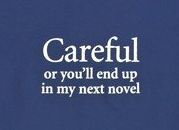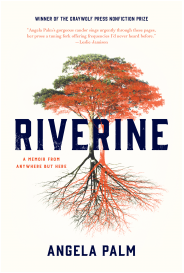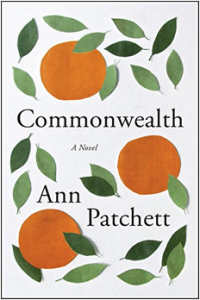Musings: Writer’s Brain, or, Whose Story Is It?
On a recent trip to Florida, my husband, some friends, and I took a short boat ride out to an uninhabited barrier island. We hiked out to the beach, and they pulled up a seat while I continued on to hunt shells. I was perhaps a quarter mile away when I decided to take a quick dip to cool off. As I turned to go back to shore, a searing pain burned through my foot. I stumbled out of the water, fell onto the sand, and watched as blood pumped with every heartbeat from the top of my foot. The pain threatened to cause a blackout.
Here are the things that went through my mind as I sat there:
- I can’t put any weight on my foot.
- I have no way to stop the bleeding.
- I am completely alone on this beach.
- I wonder how I can use this in a story.
Yes, ladies and gentlemen, this is a perfect example of writer’s brain. For all I knew, I was in the midst of a life-threatening situation with no obvious resolution, but that was no reason to delay imagining the fictional possibilities. I could immediately envision all the ways this could segue into great literature:
Thriller: Suddenly, a diver in black emerges from the ocean, brandishing his spear gun as two SUVs careen over the dunes to converge on our heroine, who produces a set of throwing stars to take out the diver and the armed thugs emerging from the SUVs.
Fantasy: Suddenly, Neptune arises from the waves, wielding his trident and riding on the back of a giant seahorse. He nods to our heroine. “Come. You are the Chosen One.”
Horror: Suddenly, razor-like spines erupt from the puncture wound as hard scales begin to form around it, radiating out to envelop our heroine’s foot, her leg, as she watches, transfixed. The transformation has begun.
Romance: Suddenly, a tall, broad-shouldered young man appears, as though from nowhere, his biceps flexing and hypnotic eyes narrowing in concern as he kneels and tenderly lifts our heroine’s foot to examine the wound. “You’re safe now. I’m a world-renown orthopedic surgeon, recently widowed—but not so recently that I can’t consider dating again, as long as it’s the right woman.”
Okay, so first drafts are rarely brilliant, but you get the idea.
Every life experience, whether it’s yours or theirs, is fair game for a writer. A favorite writer T-shirt warns, “Careful or you’ll end up in my next novel.” A friend of mine recently posted on Facebook that she was thrilled to finally have a working washing machine again, but that we should look forward to reading her tales from the Laundromat. Ditto for some painfully interesting online dating stories. No experience ever goes to waste when you’re a writer. There is literary gold wherever you turn.
It’s one thing, though, to use a single incident as a germ of an idea or a plot point for a story, especially when it’s not particularly personal. (The fact that I was the one bleeding into the sand was not a critical story element; it could have been anybody. Unfortunately, it was not.) What happens, though, when a writer decides to mine that literary gold from someone else’s personal experience? Even in memoir, the “story” does not belong solely to the writer; it inevitably involves other people’s stories, too. So the question becomes, “Whose story is it to tell?” As someone who has plumbed her own ancestral (and more recent family) stories as a basis for fiction, I’ve wrestled with this question extensively.
 Two book reviews I recently wrote for the Washington Independent Review of Books got me thinking more about this. Riverine, A Memoir from Anywhere but Here is author Angela Palm’s debut. It may seem odd for a relatively young writer to start off with a memoir, but she uses it to work through a set of issues that she’s carried around for a long time. I loved the fact that, for the most part, her story read like a novel; it felt like a first-person fictional narrative, without the self-absorption of many memoirs. While the story was deeply personal, it also opened up at least two other people’s deeply personal stories. In her case, she had their full support and permission, but this is an ethical issue that any writer should consider carefully.
Two book reviews I recently wrote for the Washington Independent Review of Books got me thinking more about this. Riverine, A Memoir from Anywhere but Here is author Angela Palm’s debut. It may seem odd for a relatively young writer to start off with a memoir, but she uses it to work through a set of issues that she’s carried around for a long time. I loved the fact that, for the most part, her story read like a novel; it felt like a first-person fictional narrative, without the self-absorption of many memoirs. While the story was deeply personal, it also opened up at least two other people’s deeply personal stories. In her case, she had their full support and permission, but this is an ethical issue that any writer should consider carefully.
 The second book, Commonwealth, is the latest novel from one of my all-time favorite authors, Ann Patchett. (For thoughts on the joys and sorrows of getting to review favorite authors, see my previous posting in LLNB. At least I’m two for three in the “joy” column now.) This novel has a distinctly different feel and tone to it than her earlier novels, in which she’s pretty unsentimental with her characters. The difference here is that this story is extensively autobiographical—though a reader unfamiliar with Patchett’s non-fiction might not know that—and considers the question of “whose story is it to tell?” head on. And on the heels of Riverine, the memoir that reads like a novel, I started to wonder, “How far from truth do you have to stray in order to consider something fiction?” More headache-inducing is the fact that Commonwealth describes a writer appropriating two entire families’ intertwined and painful life stories and passing it off as fiction, in a book called Commonwealth. It’s seriously meta, if you know the backstory. I loved it. As I noted in my review, “one can only presume that the author has gotten family dispensation, or perhaps forgiveness” for writing this book.
The second book, Commonwealth, is the latest novel from one of my all-time favorite authors, Ann Patchett. (For thoughts on the joys and sorrows of getting to review favorite authors, see my previous posting in LLNB. At least I’m two for three in the “joy” column now.) This novel has a distinctly different feel and tone to it than her earlier novels, in which she’s pretty unsentimental with her characters. The difference here is that this story is extensively autobiographical—though a reader unfamiliar with Patchett’s non-fiction might not know that—and considers the question of “whose story is it to tell?” head on. And on the heels of Riverine, the memoir that reads like a novel, I started to wonder, “How far from truth do you have to stray in order to consider something fiction?” More headache-inducing is the fact that Commonwealth describes a writer appropriating two entire families’ intertwined and painful life stories and passing it off as fiction, in a book called Commonwealth. It’s seriously meta, if you know the backstory. I loved it. As I noted in my review, “one can only presume that the author has gotten family dispensation, or perhaps forgiveness” for writing this book.
We can be grateful that Palm and Patchett decided these were their stories to tell; both are beautifully done, and I highly recommend them.
Postscript: In case you’re interested, I didn’t bleed out on the beach. It took a chain of about twenty Good Samaritans handing me off from one to another (Wave Runner to boat to golf cart to ambulance) to get me to a hospital and figure out how to reunite me with my husband and friends. True story: the guy who put me on his Wave Runner was named Gary Cooper. Who can make this stuff up?
The injury: two major puncture wounds that are still healing more than a month later. The presumed culprit: a stingray. But the first picture I took of the wound looks exactly like a classic vampire bite. Oh, the possibilities . . .
Jennifer Bort Yacovissi
Jenny Yacovissi grew up in Bethesda, Maryland, just a bit farther up the hill from Washington, D.C. Her debut novel Up the Hill to Home is a fictionalized account of her mother’s family in Washington from the Civil War to the Great Depression. In addition to writing historical and contemporary literary fiction, Jenny reviews regularly for the Washington Independent Review of Books and the Historical Novel Society. She belongs to the National Book Critic’s Circle and PEN/America. She also owns a small project management and engineering consulting firm, and enjoys gardening and being on the water. Jenny lives with her husband Jim in Crownsville, Maryland. To learn more about the families in Up the Hill to Home and see photos and artifacts from their lives, visit http://www.jbyacovissi.com/about-the-book.
- Web |
- More Posts(33)